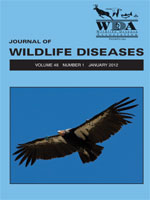To test the hypothesis that Mycoplasma ovipneumoniae is an important agent of the bighorn sheep (Ovis canadensis) pneumonia that has previously inevitably followed experimental commingling with domestic sheep (Ovis aries), we commingled M. ovipneumoniae–free domestic and bighorn sheep (n=4 each). One bighorn sheep died with acute pneumonia 90 days after commingling, but the other three remained healthy for >100 days. This unprecedented survival rate is significantly different (P=0.002) from that of previous bighorn-domestic sheep contact studies but similar to (P>0.05) bighorn sheep survival following commingling with other ungulates. The absence of epizootic respiratory disease in this experiment supports the hypothesized role of M. ovipneumoniae as a key pathogen of epizootic pneumonia in bighorn sheep commingled with domestic sheep.
BioOne.org will be down briefly for maintenance on 17 December 2024 between 18:00-22:00 Pacific Time US. We apologize for any inconvenience.
How to translate text using browser tools
1 January 2012
Survival of Bighorn Sheep (Ovis canadensis) Commingled with Domestic Sheep (Ovis aries) in the Absence of Mycoplasma ovipneumoniae
Thomas E. Besser,
E. Frances Cassirer,
Catherine Yamada,
Kathleen A. Potter,
Caroline Herndon,
William J. Foreyt,
Donald P. Knowles,
Subramaniam Srikumaran
ACCESS THE FULL ARTICLE

Journal of Wildlife Diseases
Vol. 48 • No. 1
January 2012
Vol. 48 • No. 1
January 2012
Bighorn Sheep
domestic sheep
Mycoplasma ovipneumoniae
pneumonia




